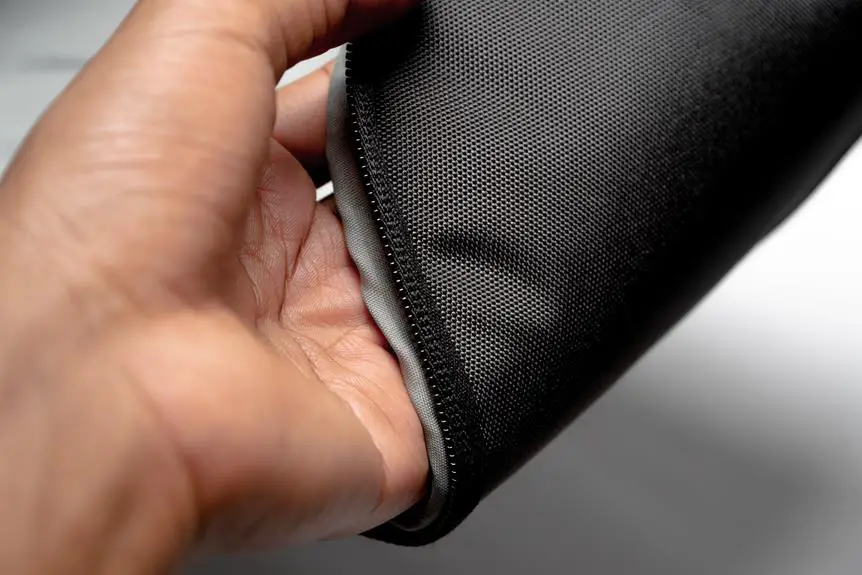Curious about the true waterproof capabilities of marine zippers? Dive into the world of marine zippers and explore their waterproofing effectiveness.
Understanding the factors that influence their waterproofing, testing the claims, and discovering maintenance tips will equip you with the knowledge needed to make an informed decision.
This exploration will also reveal alternative solutions for ensuring waterproof performance. Whether you're a seasoned sailor or an avid outdoor enthusiast, mastering the intricacies of marine zippers' waterproofing will enhance your gear selection process.
Key Takeaways
- Marine zippers are designed with precision using specialized materials and unique design to create a water-resistant barrier and ensure gear remains dry and protected in harsh marine environments.
- Manufacturers are focusing on using sustainable materials and processes, including recycled materials, and reducing harmful chemicals in production to minimize the environmental impact of marine zippers.
- Factors such as the quality of materials, zipper design, sealing mechanism, and construction techniques affect the waterproofing effectiveness of marine zippers.
- Rigorous testing under simulated marine conditions and field testing in real-life marine environments are essential to verify the waterproof claim and assess performance, providing reliable data for making informed decisions.
Understanding Marine Zippers
Do you know how marine zippers work to ensure waterproof protection for your gear? The construction of marine zippers is crucial in providing the necessary waterproofing for marine gear. Unlike regular zippers, marine zippers are designed with a high level of precision to prevent water from seeping through the teeth. The construction includes specialized materials and a unique design that creates a water-resistant barrier when the zipper is closed. This ensures that your gear remains dry and protected even in harsh marine environments.
When considering marine zippers, it's important to also think about their environmental impact. The materials used in marine zippers should be durable and resistant to corrosion from saltwater, while also being environmentally friendly. Manufacturers are increasingly focusing on using sustainable materials and production processes to minimize the impact on the marine environment. This includes using recycled materials and reducing the use of harmful chemicals in the production of marine zippers.
Understanding the construction and environmental impact of marine zippers is essential for ensuring the longevity and sustainability of marine gear. By choosing high-quality, environmentally friendly marine zippers, you can protect your gear while minimizing your impact on the marine environment.
Factors Affecting Waterproofing
To ensure the waterproofing of marine zippers, it's essential to consider factors such as the quality of materials, zipper design, and the effectiveness of the sealing mechanism. When evaluating the waterproofing of marine zippers, here are some crucial factors to take into account:
- Quality of Materials: The durability and effectiveness of waterproof marine zippers heavily depend on the quality of materials used in their construction. High-grade, corrosion-resistant materials such as stainless steel or marine-grade brass enhance the overall effectiveness of the zipper in wet environments.
- Zipper Design: The design of the zipper, including the size and shape of the teeth, plays a significant role in its ability to prevent water penetration. A well-designed zipper with tightly interlocking teeth can enhance the waterproofing capability.
- Effectiveness of the Sealing Mechanism: The effectiveness of the sealing mechanism, such as the presence of protective flaps or covers, greatly influences the zipper's ability to keep water out. A robust sealing mechanism is essential for maintaining waterproof integrity.
- Construction Techniques: The construction techniques used in assembling the zipper also impact its waterproofing. Techniques such as high-frequency welding or heat-sealing can enhance the overall effectiveness of the zipper in preventing water ingress.
Considering these factors is crucial in ensuring that marine zippers maintain their waterproofing capabilities, providing reliable protection against water intrusion in marine environments.
Testing the Waterproof Claim
You can verify the waterproof claim of marine zippers by conducting rigorous testing under various simulated marine conditions. Field testing is a crucial aspect of evaluating the waterproof claim of marine zippers. It involves subjecting the zippers to real-life marine environments to assess their performance. This testing process typically includes exposure to water, salt, and UV radiation, as well as frequent opening and closing to mimic actual usage. By conducting field testing, you can gather valuable data on how marine zippers withstand the harsh conditions they're likely to encounter.
Furthermore, it's essential to adhere to industry standards when testing the waterproof claim of marine zippers. These standards outline specific testing protocols and criteria for determining the waterproof capabilities of zippers. Adhering to industry standards ensures that the testing process is comprehensive and consistent, allowing for accurate comparisons between different zipper products. This approach provides an objective basis for evaluating the waterproof claim and helps consumers make informed decisions based on reliable data.
Maintenance and Care Tips
Now, let's talk about how to properly clean and maintain your marine zippers to ensure their waterproof performance.
Regular cleaning and proper lubrication are essential for prolonging the life and functionality of your marine zippers.
Proper Cleaning Techniques
Regular maintenance of your marine zippers is essential to ensure their continued waterproof performance. To keep your marine zippers in top condition, follow these proper cleaning techniques:
- Gentle Cleaning: Use a soft brush, mild soap, and lukewarm water to clean the zipper and avoid harsh chemicals that may damage the water repellent coating.
- Rinsing and Drying: Thoroughly rinse the zipper with clean water after cleaning to remove any soap residue. Allow it to air dry completely before storage to prevent mold or mildew growth.
- Avoiding Heat: Don't expose the zipper to excessive heat, as it can cause the water repellent coating to deteriorate.
- Regular Inspection: Periodically inspect the zippers for any signs of wear or damage, and address any issues promptly to maintain their waterproof capabilities.
Following these maintenance and care tips will help prolong the life and effectiveness of your marine zippers.
Lubrication for Longevity
To maintain the waterproof performance of your marine zippers, proper lubrication is essential for longevity and continued effectiveness. Use silicone-based lubricants or paraffin wax for smooth operation. Apply the lubricant along the entire length of the zipper teeth, ensuring even coverage.
Avoid using petroleum-based products as they can attract dirt and debris, compromising the zipper's functionality. Regularly inspect the zippers for signs of corrosion and promptly address any issues. Corrosion prevention is crucial for maintaining the integrity of the zippers.
Clean the zippers before applying lubricants to remove salt, sand, and other debris that can contribute to corrosion. By following these lubrication techniques and corrosion prevention measures, you can ensure that your marine zippers remain waterproof and functional for an extended period.
Alternative Waterproofing Solutions
Consider exploring alternative waterproofing solutions to enhance the protection of marine zippers in harsh conditions. When traditional methods of lubrication may not be sufficient to keep water out, alternative solutions can provide added protection. Here are some options to consider:
- Silicone spray: This solution creates a waterproof barrier on the zipper, repelling water and preventing moisture from seeping through. It's easy to apply and can provide long-lasting protection in marine environments.
- Seam sealing: Applying seam sealer along the zipper seams can reinforce the waterproofing, ensuring that no water penetrates through the stitching. Seam sealing is a popular method for enhancing the water resistance of marine zippers.
- Wax-based waterproofing: Using a wax-based product designed specifically for waterproofing can effectively shield marine zippers from water intrusion. The wax creates a protective barrier, enhancing the zipper's ability to keep water out.
- Polyurethane coatings: Applying a polyurethane coating to the zipper fabric can significantly improve its water resistance. This method provides a durable and long-lasting waterproofing solution for marine zippers.
Real-World Waterproof Performance
When it comes to real-world waterproof performance, you might wonder if marine zippers truly stand up to the challenge. Field testing and customer feedback provide valuable insights into the material durability and design effectiveness of marine zippers. Here's a concise breakdown of the real-world waterproof performance of marine zippers:
| Waterproof Performance | Description |
|---|---|
| Field Testing | Rigorous testing in actual marine environments to assess water resistance and durability. |
| Customer Feedback | Compilation of user experiences and opinions regarding the waterproof capabilities of marine zippers. |
Field testing allows for objective assessments of how well marine zippers withstand varying environmental conditions, while customer feedback provides valuable real-world insights. The combination of these methods helps determine the true waterproof performance of marine zippers. Material durability and design effectiveness are crucial factors that influence the overall waterproof performance of marine zippers, and through rigorous testing and user experiences, a clearer understanding of their capabilities emerges.
Frequently Asked Questions
Can Marine Zippers Be Used in Saltwater Environments Without Compromising Their Waterproofing?
In saltwater environments, marine zippers can maintain waterproofing with proper maintenance. However, exposure to saltwater can accelerate wear and compromise durability. Regular rinsing and lubrication are essential preventive measures for optimal performance and longevity.
Are There Any Specific Cleaning Products or Methods That Should Be Used to Maintain the Waterproofing of Marine Zippers?
To maintain the waterproofing of marine zippers, use cleaning methods and maintenance products specifically designed for saltwater resilience. Avoid waterproofing mistakes by following prevention tips. Look for superior brands for longevity expectations.
How Long Can Marine Zippers Be Expected to Maintain Their Waterproofing Under Regular Use and Exposure to the Elements?
Marine zippers are generally designed to maintain their waterproofing for an extended period under regular use and exposure to the elements. However, the expected durability can vary based on environmental impact and maintenance practices.
Are There Any Specific Types or Brands of Marine Zippers That Are Known for Their Superior Waterproofing Performance?
When it comes to marine zippers, various types and brands offer different levels of waterproofing performance. Some are designed specifically for saltwater use. Proper cleaning methods and preventative techniques can prolong their longevity.
What Are the Most Common Mistakes That Can Compromise the Waterproofing of Marine Zippers, and How Can They Be Avoided?
To protect marine zippers from compromising waterproofing, avoid common mistakes like neglecting regular maintenance. Proper care ensures longevity. Employing appropriate maintenance methods is crucial and sets realistic longevity expectations.






